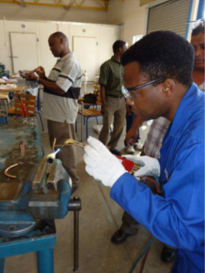R-290 air conditioners in Ghana
Prognoses anticipate a rapid market expansion for unitary air-conditioning, as Ghana enjoys a comparatively stable economic growth and a high cooling demand due to its hot and humid climate. The RAC sector causes high GHG and ODS emissions since most appliances in Ghana have low energy efficiency and high leakage rates. The mitigation potential for unitary air-conditioning systems is estimated at 2.44 Mt CO2eq in 2030 when compared to a business-as-usual (BAU)-Scenario.
An exemplary technology partnership has been established between GCI, the Environmental Protection Agency (EPA) and the Ghana National Cleaner Production Centre (GNCPC). During a national workshop R-290 split ACs were demonstrated, and thirty further units ordered. Energy meters are being installed to monitor the energy consumption of the new appliances in different locations. Technical trainings have been conducted to ensure safe handling of the hydrocarbon refrigerant. The next steps will be the integration in Green Public Procurement strategies, public events to promote the R-290 technology, procurement of additional units as well as further trainings and monitoring (energy and performance).

